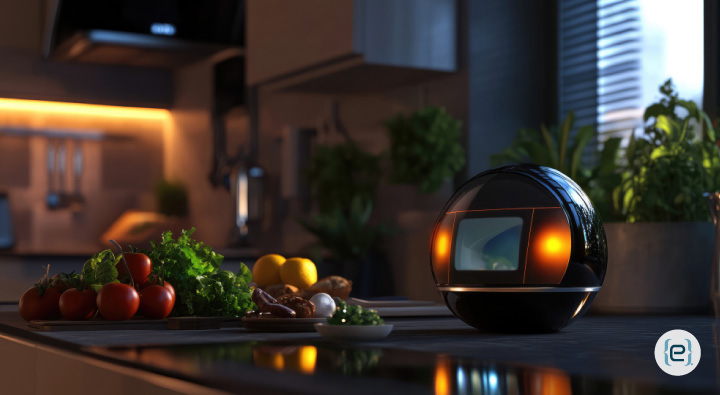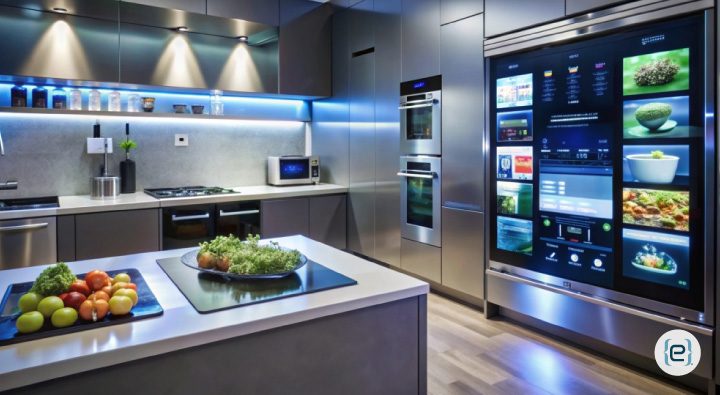Last night, I watched my neighbor’s smart kitchen system automatically adjust her oven temperature based on moisture sensors in her roasting chicken. Meanwhile, my basic oven burned my cookies because I got distracted by a phone call. Here’s my controversial take: within a decade, cooking without AI will seem as outdated as cooking over an open fire.
The Present Plate
Today’s AI-enabled kitchens are already doing things that would make Julia Child’s head spin. Imagine smart ovens that recognize what you’re cooking and adjust temperature accordingly. Picture refrigerators that track your ingredients and suggest recipes based on what’s about to expire. Even blenders now detect when your smoothie has reached the perfect consistency.
- Smart Appliances: These devices use sensors and AI to automate cooking, reducing human error and saving time.
- Ingredient Tracking: Fridges and pantries now monitor inventory, helping you avoid food waste and last-minute runs to the store.
- Consistency Control: Blenders and ovens ensure your recipes turn out perfectly every time.
The Recipe Whisperer
Remember flipping through cookbooks, hoping to find something you could make with random pantry ingredients? Now, AI systems can analyze your available ingredients and generate recipes that not only use what you have but adapt to your dietary restrictions and taste preferences. It’s like having a personal chef who knows exactly what’s in your kitchen.
Silicon Valley startups are even using machine learning to create new flavor combinations that human chefs might never imagine. One company uses AI to analyze molecular compounds in ingredients, predicting unusual but delicious pairings. Strawberry and mushroom risotto? The AI says it works—and surprisingly, it does.
The Kitchen Assistant
Smart kitchen aids are evolving beyond simple timers and temperature probes. Modern systems can watch your cooking through cameras and alert you when your sauce is about to burn or your pasta is perfectly al dente. It’s like having a seasoned chef looking over your shoulder, minus the Gordon Ramsay-style commentary.
- Visual Monitoring: AI-powered cameras help prevent overcooking and ensure food safety.
- Voice Guidance: Virtual assistants walk you through each step, adapting instructions to your skill level.
The Shopping Scientist & Waste Warrior
AI isn’t just changing how you cook—it’s revolutionizing how you shop for food. Smart systems track your purchasing patterns, predict when you’ll run out of staples, and even adjust orders based on upcoming recipes you’ve saved. One family I know hasn’t run out of milk in six months thanks to their AI shopping assistant.
Food waste is also becoming a thing of the past. Systems track ingredient freshness, suggest recipes to use up perishables, and even adjust portion sizes based on your historical consumption patterns. It’s like having a frugal grandmother’s wisdom built into your kitchen.

The Future Feast & Nutrition Navigator
Looking ahead, the possibilities are mind-boggling. Imagine 3D food printers guided by AI that can recreate your grandmother’s secret recipe based on a photo and description of the taste. Picture robotic kitchen assistants that can chop vegetables at lightning speed while learning your taste preferences.
Future AI systems won’t just help you cook—they’ll optimize your nutrition in real time. Imagine a system that adjusts recipes based on your recent blood work, activity level, and health goals. Craving mac and cheese? Your AI chef might suggest a cauliflower version with added nutrients your body currently needs.
The Social Sauce & Cultural Curator
AI is also transforming how you share and adapt recipes. Machine learning algorithms can analyze thousands of recipe reviews and comments, automatically adjusting instructions based on common issues or improvements suggested by users. It’s like having the collective wisdom of millions of home cooks at your fingertips.
One fascinating development is AI’s ability to preserve and adapt traditional recipes. Systems are already documenting disappearing cultural dishes and adapting them for modern ingredients and equipment while maintaining their essential character. It’s like having a culinary anthropologist in your kitchen.
The Expert Edge: Why IT Support is Your Secret Ingredient
This is where robust technology infrastructure becomes crucial. Just as professional kitchens need reliable equipment, AI-enabled cooking systems need solid IT support. Companies like eMazzanti Technologies understand that as your kitchen becomes smarter, the technology supporting it needs to be bulletproof.
Whether you’re a home cook or a professional chef, having reliable technology support isn’t optional anymore—it’s as essential as having sharp knives. A secure, always-on network ensures your smart appliances communicate seamlessly and your data stays protected. Learn more about security and privacy for your digital kitchen.
The Strategic Shift: Building a Future-Ready Kitchen
Looking ahead, successful implementation of AI in cooking requires more than just smart appliances—it needs reliable networks, secure data handling, and seamless integration. The most successful smart kitchen solutions partner with IT experts who understand both technology and user needs. See how driving innovation with managed services can support your culinary ambitions.
In today’s rapidly evolving culinary landscape, the integration of AI isn’t just a luxury—it’s becoming essential for efficient, sustainable, and enjoyable cooking. Imagine a kitchen that not only cooks with you but learns from you. One that combines the precision of technology with the soulfulness of traditional cooking.
That future isn’t just coming—it’s already beginning to simmer. The question isn’t whether AI will transform cooking, but how you’ll adapt your infrastructure to support this transformation.
Ready to future-proof your kitchen and culinary business? Contact eMazzanti today to learn how we can help you build the technological foundation for your digital chef revolution. The real feast of AI-enabled cooking is still to come—but only for those who prepare their kitchens for what’s next.






